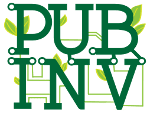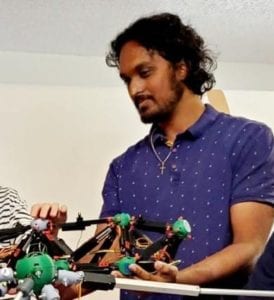Avinash Baskaran has been with Public Invention since it was just him and Dr. Robert Read inventing in a basement. And as Public Invention has grown, so has Avinash.
“I met Rob at Engineers Without Borders a few years ago, and we talked about our interests, what we were thinking about, and the kinds of things we wanted to see in the world and the change that we wanted in engineering,” he says. “And he invited me to help on a project. And from there, I’ve been growing with him and getting to know him and his goals and aspirations for Public Invention. I got really invested in it.”
What started as a small operation has grown into a thriving non-profit organization. In fact, just this past weekend, Avinash and Dr. Read virtually presented a co-authored paper to 2020’s International Conference on Mechatronics and Mechanical Engineering.
Avinash views Public Invention as the perfect “way stop” for people in the midst of their careers, or a good jumping off point for people just getting started—a place for people to come and “catch up on who they want to be as an engineer and explore what that means to them.”
And for Avinash, Public Invention has been exactly that place; Avinash’s time at Public Invention has been marked by both internal and external exploration, which ultimately led to a decision to pursue a PhD in Mechanical Engineering at Auburn University. He hopes his degree will lead him to working on projects funded either federally, individually, or philanthropically. “Instead of working on products for people to consume, I want to work on these next level humanitarian projects,” he says. “These projects might not have a lot of excitement or be the most interesting, but they’re going to hopefully, in the future, be really beneficial for a lot of people.” He credits Dr. Read for opening his eyes to the countless engineering opportunities within his reach.
With that said, Avinash highlights the way in which Public Invention has taken on a new light in 2020—a year that’s been defined by a global pandemic. When COVID-19 hit, Public Invention jumped into action, putting aside its other projects to focus on the VentMon for pandemic relief.
With the pandemic, Public Invention grew into its role as a decentralized, modular organization, collaborating with teams all over the world to do different things in the pursuit of beating the coronavirus. “We used the power of the internet and the power of Zoom and social media and all these different things to communicate ideas and share models and codes, and doing it all in a very open source and public way,” Avinash says. “For us, it’s all about, ‘Hey, how can we do better if you have an idea?’ If someone has an idea, tell us so that we can do better.”
Avinash hopes that this open-source pandemic relief effort will translate into more collaboration between teams across the world in general. “I think there’ll be a move toward where whole projects will be managed and distributed globally, instead of in single groups. One guy in Argentina, one in Texas, and one in New York,” he says. “A global community working together.”
When Avinash is not collaborating with Public Invention or working hard at his PhD, he loves to paint, cook, and play the violin. He also spends a lot of time with his friends “studying the Bible, talking about God, and exploring how that relates to what we do as individuals.”
Avinash is driven by his desire to leverage science and technology to restore the function, independence, and quality of life of people with disabilities. His research interests include assistive robotics, telepresence and human robot interaction. In his spare time, he enjoys painting, listening to music and completing DIY projects.

